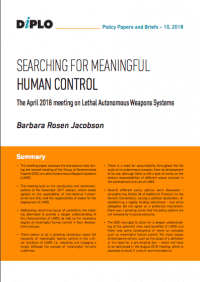Briefing Papers
DiploFoundation’s Briefing Papers series focuses on a variety of issues related to diplomatic practice and internet governance (IG). The papers cover both recent events and historical developments which aim to provide diplomatic and IG practitioners with concise overviews of key and emerging issues they face. They offer a space for reflections beyond day-to-day work, but are simultaneously rooted in practice.
Our contributors are practitioners as well as academics.
If you have any questions, or would like to contribute to our series, please contact Dr Katharina Höne at katharinah@diplomacy.edu.
DiploFoundation Briefing Papers editions:
- Paper #16: Citizen Diplomats: Exploring the Links Between Community Organising and Humanitarian Diplomacy (April 2021)
- Paper #15: Bilateral Diplomacy: A Practitioner Perspective (November 2020)
- Paper #14: Virtual Reality and the Future of Peacemaking (June 2020)
- Paper #13: The EU’s New Commission: Digital Policy in the Limelight (December 2019)
- Paper #12: Updating International Geneva to the Data-driven Era (November 2018)
- Paper #11: Developing Community-level Capacity Assessment Tools: Perspectives and Practical Applications in the Context of Rural Africa (September 2018)
- Paper #10: Searching for Meaningful Human Control. The April 2018 Meeting on Lethal Autonomous Weapons Systems (April 2018)
- Paper #9: A Tipping Point for the Internet: Predictions for 2018 (January 2018)
- Paper #8: Lethal Autonomous Weapons Systems: Mapping the GGE Debate (November 2017)
- Paper #7: Digital Diplomacy and the ICRC (November 2017)
- Paper #6: Ten Theoretical Clues to Understanding United Nations Reform (September 2017)
- Paper #5: Leaving No One Behind in the Data Revolution (August 2017)
- Paper #4: Promotion Methods in Foreign Ministries (April 2017)
- Paper #3: Namibia’s Digital Foreign Policy and Diplomacy (March 2016)
- Paper #2: The MIKTA Way Forward (February 2015)
- Paper #1: Global Inviolability of the Internet Root Zone (January 2014)
Briefing Paper #16: April 2021
Citizen Diplomats: Exploring the Links Between Community Organising and Humanitarian Diplomacy
By Hannah Bird
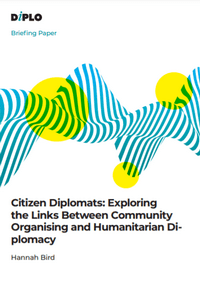
In this briefing paper, Hannah Bird explores the links between community organising and humanitarian diplomacy by drawing on the concepts and methods of community organising.
Some of the key points of the paper include:
- This paper explores whether there is any middle ground between the generally top-down approaches to local involvement taken by organisations engaged in humanitarian diplomacy, and the often spontaneous grassroots citizen actions, which are often disparate and lack clear goals, and may be relatively short-term.
- The key to such a middle ground may lie in the concept and methods of community organising. While communities have organised and conducted advocacy for centuries, the modern understanding of this term comes from the work Saul Alinsky did in the USA in the 1930s, his seminal texts, and how others have taken up and adapted his approach.
- There is much potential for linkages between the humanitarian diplomats and community organisers, with the case study demonstrating that locally-rooted organisations and individuals can be successfully engaged on global humanitarian issues and can make useful contributions to humanitarian diplomacy strategies.
- As such, the concept of a ‘citizen diplomat’ could be broadened into ’citizen humanitarian’, a new kind of humanitarian working in organisations that operate horizontally through mutual learning and aid.
Briefing Paper #15: November 2020
Bilateral Diplomacy: A Practitioner Perspective
By Kishan S. Rana
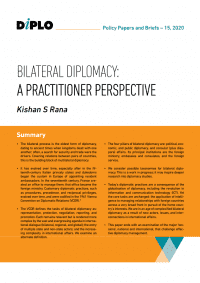
In this briefing paper, Amb. Rana provides an overview and mapping of bilateral diplomacy. He provides a number of taxonomies and examples that are useful for scholars and practitioners alike.
Some of the key points of the paper include:
- The bilateral process is the oldest form of diplomacy, dating to ancient times when kingdoms dealt with one another. Bilateral relations between pairs of countries are the building block of multilateral diplomacy.
- The Vienna Convention on Diplomatic Relations defines the tasks of bilateral diplomacy as: representation, protection, negotiation, reporting, and promotion.
- The four pillars of bilateral diplomacy are: political, economic, and public diplomacy, and consular (plus diaspora) affairs. Its principal institutions are the foreign ministry, embassies and consulates, and the foreign service.
- Today’s diplomatic practices are a consequence of the globalisation of diplomacy, including the revolution in information and communication technology (ICT).
- The paper ends with an examination of the major ‘tensions’, national and international, that challenge effective diplomacy management.
Briefing Paper #14: June 2020
Virtual Reality and the Future of Peacemaking
By Julie A. Gregory
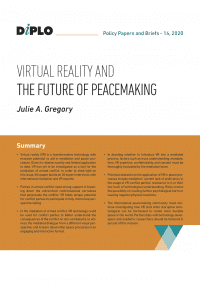
In this briefing paper, Ms Julie A. Gregory explores the potential of virtual-reality technology (VR) to support mediation and peace processes.
Some of the key points of the paper include:
- Given its relative novelty and limited application to date, VR has yet to be investigated as a tool for the mediation of armed conflict. In order to shed light on this issue, this paper builds on 30 expert interviews with international mediation and VR experts.
- Parties in armed conflict need strong support in breaking down the entrenched confrontational narratives that perpetuate the conflict. VR holds unique potential for conflict parties to participate in fully immersive perspective taking.
- In the mediation of armed conflict, VR technology could be used for conflict parties to better understand the consequences of the conflict on non-combatants, to witness the mediated dialogue from a different visual perspective, and to learn about other peace processes in an engaging and interactive format.
- In deciding whether to introduce VR into a mediated process, factors such as trust, understanding, mandate, time, VR expertise, confidentiality, and consent must be thoroughly evaluated by the mediation team.
Briefing Paper #13: December 2019
The EU’s New Commission: Digital Policy in the Limelight
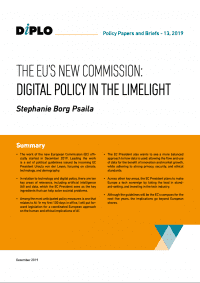
In this briefing paper, Dr Stephanie Borg Psaila analyses Ursula von der Leyen’s new EU Commission’s emphasis on digital policy for 2019–2024.
The paper underlines that:
- In relation to technology and digital policy, there are ten key areas of relevance, including artificial intelligence (AI) and data, which the EC president sees as the key ingredients that can help solve societal problems.
- Among the most anticipated policy measures is one that relates to AI: ‘In my first 100 days in office, I will put forward legislation for a coordinated European approach on the human and ethical implications of AI.’
- The EC president also wants to see a more balanced approach to how data is used: allowing the flow and use of data for the benefit of innovation and market growth, while adhering to strong privacy, security, and ethical standards.
- Across other key areas, the EC president plans to make Europe a tech sovereign by taking the lead in standard-setting, and investing in the tech industry.
- Although the guidelines will be the EC’s compass for the next five years, the implications go beyond European shores.
Briefing Paper #12: November 2018
Updating International Geneva to the Data-driven Era
By Rafaela Marinho and Avi Krish Bedi
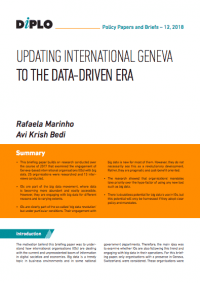
In this briefing paper, Ms Rafaela Marinho and Mr Avi Krish Bedi outline their research on how international organisations (IOs) in Geneva address and use big data in their work.
They find that:
- IOs are part of the big data movement, where data is becoming more abundant and easily accessible. However, they are engaging with big data for different reasons and to varying extents.
- IOs are clearly part of the so-called ‘big data revolution’ but under particular conditions. Their engagement with big data is new for most of them. However, they do not necessarily see this as a revolutionary development. Rather, they are pragmatic and cost-benefit oriented.
- The research showed that organisations’ mandates take priority over the hype factor of using any new tool such as big data.
- There is doubtless potential for big data’s use in IOs, but this potential will only be harnessed if they adopt clear policy and mandates.
Briefing Paper #11: September 2018
By Yasuko Kusakari
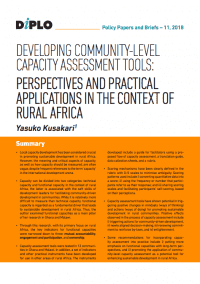
In this briefing paper, Dr Yasuko Kusakari builds on her research on community-level capacity assessment in order to make suggestions for assessment tools and scoring mechanisms.
She finds that:
- Local capacity development has been considered crucial in promoting sustainable development in rural Africa. However, the meaning and critical aspects of capacity, as well as how capacity should be measured, are often vague, despite frequent references to the term ‘capacity’ in the international development arena.
- Capacity can be divided into two categories: technical capacity and functional capacity. In the context of rural Africa, the latter is associated with the soft skills of development leaders for facilitating community-driven development in communities.
- Through this research, with its primary focus on rural Africa, the key indicators for functional capacities were narrowed down to three: mutual accountability, engagement and participation, and ownership.
- Capacity-assessment tools were tested in 12 communities in Ghana and Malawi. In addition, a set of indicators and other practical instruments have been developed for use in other areas of rural Africa. The instruments developed include a guide for facilitators using a proposed flow of capacity assessment, a translation guide, data collection sheets, and a rubric.
- Scoring mechanisms have been clearly defined in the rubric with 0–5 scales to minimise ambiguity. Scoring patterns used include: i) converting quantitative data into a score, ii) using the frequency or number that participants refer to as their response, and iii) sharing scoring scales and facilitating participants’ self-scoring, based on their perceptions.
- Capacity-assessment tools have shown the potential in triggering positive changes in mindsets (ways of thinking) and actions (ways of doing) for promoting sustainable development in rural communities.
Briefing Paper #10: April 2018
Searching for Meaningful Human Control. The April 2018 Meeting on Lethal Autonomous Weapons Systems
In this briefing paper, Ms Barbara Rosen Jacobson analyses the debate of the April 2018 meeting of the Group of Governmental Experts (GGE) of the Convention on Certain Conventional Weapons (CCW). The group was established to discuss emerging technologies in the area of lethal autonomous weapons systems (LAWS).
She finds that:
- The meeting built on the conclusions and recommendations of the November 2017 session where states agreed on the applicability of international humanitarian law (IHL) and the responsibility of states for the deployment of LAWS.
- Addressing remaining issues of contention, the meeting attempted to provide a deeper understanding of the characteristics of LAWS, as well as the necessary degree of meaningful human control in their development and use.
- There seems to be a growing consensus about the necessity of meaningful human control in the critical functions of LAWS, i.e. selecting and engaging a target, although the concept of ‘meaningful’ remains undefined.
- There is a need for accountability throughout the life cycle of an autonomous weapon, from its development to its use, although there is still a lack of clarity on the distinct responsibilities of different actors involved in the development and use of LAWS.
- Several different policy options were discussed – strengthening Article 36 of Additional Protocol I to the Geneva Conventions, issuing a political declaration, or establishing a legally binding instrument – and while delegates did not agree on a preferred mechanism, there was a growing sense that the policy options are not necessarily mutually exclusive.
- The GGE managed to allow for a deeper understanding of the potential risks (and benefits) of LAWS and there was some convergence of views on concepts such as meaningful human control. Yet, many issues of divergence remain, such as the scope of a definition or the need for a pre-emptive ban – which will have to be addressed in the August 2018 meeting, which is expected to result in a set of recommendations.
Briefing Paper #9: January 2018
A Tipping Point for the Internet: Predictions for 2018
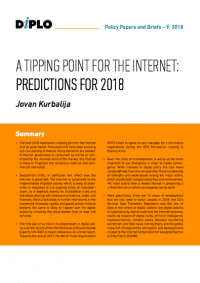
In this briefing paper, Dr Jovan Kurbalija shares his predictions for ten main digital policy developments in 2018. The forecast is set against this broad backdrop that makes progress and retreat equally possible. It draws on continuous monitoring of digital policy carried out through the Geneva Internet Platform’s (GIP) Digital Watch observatory and further discussed during the GIP’s monthly briefings.
He argues that:
- The year 2018 represents a tipping point for the internet and its governance. If internet governance is consumed by inertia or controlled by the invisible hand of the market, the internet is likely to fragment into numerous national and commercial internet(s).
- Geopolitical shifts, in particular, will affect how the internet is governed. The internet is vulnerable to the fragmentation of global society, which is likely to accelerate in response to the ongoing crisis of multilateralism.
- The first sign of a crisis in multilateralism in digital policy was the failure of the 5th UN Group of Governmental Experts (UN GGE) to reach consensus on a final report. Towards the end of 2017, the World Trade Organization (WTO) failed to agree on any mandate for e-commerce negotiations during the WTO Ministerial Conference in Buenos Aires.
- Given the crisis of multilateralism, it will be all the more important to use divergence in order to create convergence. While interests in digital policy are now more closely defined, they vary considerably. There is a diversity of strengths and weaknesses among the major actors, which creates both complementarities and controversies. Yet, most actors have a vested interest in preserving a unified internet on which convergence can be built.
- More specifically, there are ten areas of development that we will need to watch closely in 2018: the EU’s General Data Protection Regulation (GDPR) and the role of data at the centre of digital politics, the digital politics of cybersecurity, digital trade and the internet economy, courts as makers of digital rules, artificial intelligence, cryptocurrencies, content policy between countering extremism and fake news, net neutrality and the global impact of US regulations, encryption, and developments related to the Internet Corporation for Assigned Names and Numbers (ICANN).
Briefing Paper #8: November 2017
Lethal Autonomous Weapons Systems: Mapping the GGE Debate
By Barbara Rosen Jacobson
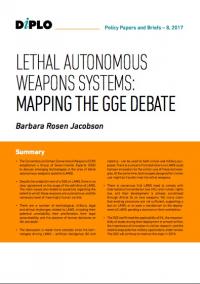
In this briefing paper, Ms Barbara Rosen Jacobson analyses the debate of the first meeting of the Group of Governmental Experts (GGE) of the Convention on Certain Conventional Weapons (CCW). The group was established to discuss emerging technologies in the area of lethal autonomous weapons systems (LAWS).
She finds that:
- There is no clear agreement yet on the scope of the definition of LAWS. Key questions related to the degree of autonomy that such a definition should encompass and the necessary level of meaningful human control that LAWS should maintain.
- There are a number of technological, military, legal, and ethical challenges related to LAWS, including their potential unreliability, their proliferation, the question of legal accountability, and the absence of human decisions on life and death.
- The discussion is made more complex since the technologies driving LAWS – artificial intelligence (AI) and robotics – can be used for both civilian and military purposes. There is a concern that restrictions on LAWS could hamper innovation for the civilian use of these technologies. At the same time, technologies designed for civilian use might be transformed into lethal weapons.
- There is consensus that LAWS need to comply with international humanitarian law (IHL) and human rights law, and their development is already scrutinised through Article 36 on new weapons. Yet, some claim that existing provisions are not sufficient, supporting a ban on LAWS, or at least a moratorium on their deployment of LAWS, pending a decision on their prohibition.
- In the concluding report of the GGE, the group reaffirmed the applicability of IHL, the responsibility of states during the deployment of LAWS in armed conflict, the importance of innovation in civilian research, and the need to keep potential military applications under review. The GGE will continue to meet on this topic in 2018.
Briefing Paper #7: November 2017
Digital Diplomacy and the ICRC
By Alice Maillot
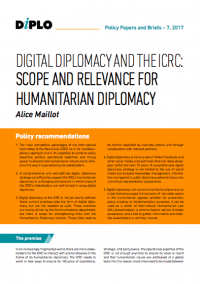
In this briefing paper, Ms Alice Maillot discusses the potential of digital diplomacy for the International Committee of the Red Cross (ICRC). She looks at the changing nature of diplomacy, new developments in digital diplomacy, and how the ICRC can implement and adopt some of the current trends.
She finds that:
- The main competitive advantages of the ICRC lie in its multidisciplinary approach and in its capability to combine policy expertise, politics, operational expertise, and strong power to disseminate humanitarian values and to influence the way it is perceived by its stakeholders.
- A comprehensive and well-defined digital diplomacy strategy can efficiently support the ICRC’s humanitarian diplomacy in a changing environment in which many of the ICRC’s stakeholders are well versed in using digital diplomacy.
- Digital diplomacy at the ICRC is not yet clearly defined. Some current practices take the form of digital diplomacy, but are not labelled as such. These practices are mainly driven by the Communications Department, but there is scope for strengthening links with the Humanitarian Diplomacy division. These links need to be further exploited by concrete actions and through collaboration with relevant partners.
- A comprehensive digital diplomacy strategy is not limited to the use of social media, but includes knowledge management, information management, public diplomacy, external resources, and virtual representation components.
- Digital diplomacy can serve humanitarian diplomacy as a tool that encourages the inclusion of non-state actors in the humanitarian agenda, whether for prevention, policy-shaping, or implementation purposes.
Briefing Paper #6: September 2017
Ten theoretical clues to understanding United Nations reform
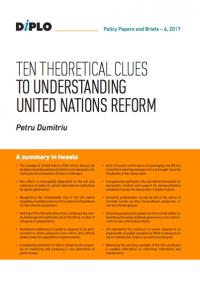
In this briefing paper, Dr Petru Dumitriu offers ten theoretical clues to understanding UN reform. Among other issues, he discusses the UN mandate, limits of power, and questions of legitimacy.
He finds that:
- The concept of United Nations (UN) reform should not be determined by existing limitations and obstacles, but mainly by the anticipation of future challenges.
- Recognising the irreplaceable role of the UN means accepting multilateralism as the fundamental backbone of international cooperation.
- A substantive direction of reform should be the emphasis on mobilising and catalysing a new generation of partnerships.
- A progressive codification of a normative framework for democratic conduct and support for democratisation processes may be the key to other transformations.
- The UN represents the maximum of power allowed to an organisation of global competence: What is necessary is not an institutional surplus, but extra functionality.
- Reforming the working concepts of the UN constitutes a credible alternative to reforming institutions and mechanisms.
Briefing Paper #5: August 2017
Leaving No One Behind in the Data Revolution
By Barbara Rosen Jacobson
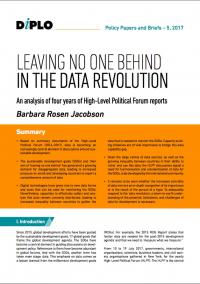
In this briefing paper, Ms Barbara Rosen Jacobson analyses data-related discussions of the High-Level Political Forum on Sustainable Development (HLPF) between 2014 and 2017.
She finds that:
- Data is becoming an increasingly central element in discussions around sustainable development.
- The sustainable development goals (SDGs) and their aim of ‘leaving no one behind’ have generated a growing demand for disaggregated data, leading to increased pressure on small and developing countries to report a comprehensive amount of data.
- Digital technologies have given rise to new data forms and sizes that can be used for monitoring the SDGs. Nevertheless, capacities to effectively collect and analyse this data remain unevenly distributed, leading to increased inequality between countries. Capacity development initiatives are of vital importance to bridging this data capability gap.
- Given the large variety of data sources, as well as the growing inequality between countries in their ability to ‘mine’ and use this data, the HLPF discussions signal a need for harmonisation and standardisation of data for the SDGs.
- It remains to be seen whether the increased centrality of data mirrors an in-depth recognition of its importance or is the result of the pursuit of a hype.
Briefing Paper #4: April 2017
Promotion Methods in Foreign Ministries
By Kishan S. Rana
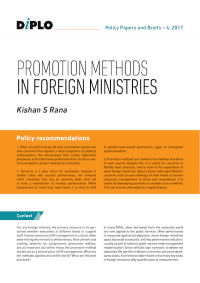
Ambassador Rana looks at promotion methods in foreign ministries around the world. He introduces the distinction between merit-based, seniority-based, and ad-hoc promotions, and highlights the different exam methods in foreign ministries.
He makes three recommendations:
- Often, countries that do not have a promotion system are also countries that appoint a large proportion of political ambassadors; this demoralises their career diplomatic personnel, and undermines professionalism. It is thus useful to establish a proper method for promotion.
- Seniority is a poor basis for promotion because it neither takes into account performance, nor rewards merit. Countries that rely on seniority often tend not to have a mechanism to monitor performance. While assessment of merit may have flaws, it is vital to shift to performance-based promotions, again to strengthen professionalism.
- Promotion methods are rooted in the tradition and ethos of each country. Despite this, it is useful for countries to identify best practices, and to look to the experience of other foreign ministries. About a dozen-odd major Western countries hold annual meetings of their heads of human resources management, to share their experiences. It is useful for developing countries to consider such a method. This can also be attempted on a regional basis.
Briefing Paper #3: March 2016
Namibia’s Digital Foreign Policy and Diplomacy
By Katharina E. Höne
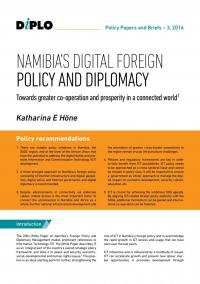
This briefing paper emerged from Diplo’s participation in Namibia’s Foreign Policy Review Conference (July 2016). In this paper, Dr Katharina E. Höne suggests a three-pronged approach to Namibia’s digital foreign policy and diplomacy, and looks at the discourse on information and communications technology (ICT) and development.
She makes five recommendations:
- There are notable policy initiatives in Namibia, the Southern African Development Community (SADC) region, and at the level of the African Union (AU) that have the potential to address the digital divide and promote ICT development.
- A three-pronged approach to Namibia’s foreign policy, consisting of internet infrastructure and digital geopolitics, digital policy and internet governance, and digital diplomacy is recommended.
- Despite advancements in connectivity via undersea cables, mobile access is the most important factor to connect the unconnected in Namibia and Africa as a whole. Further national infrastructure development and the promotion of greater cross-border connectivity in the region remain crucial infrastructure challenges.
- Policies and regulatory frameworks are key in order to fully benefit from ICT possibilities. ICT policy needs to be approached as a cross-sectoral issue and cannot be treated in policy silos. It will be important to ensure a ‘whole-of-government’ approach to manage the digital impact on economic development, security, culture, education, etc.
- ICT is crucial for achieving the ambitious SDG agenda. By aligning ICT-related foreign policy explicitly with the sustainable development goals (SDGs), additional momentum can be gained and international cooperation can be fostered.
Briefing Paper #2: February 2015
By Barbara Rosen Jacobson
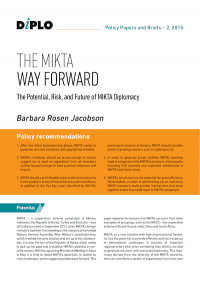
Ms Rosen Jacobson assesses the potential, risk, and future of MIKTA, a cooperation scheme comprising Mexico, Indonesia, the Republic of Korea, Turkey, and Australia, which was officially launched in September 2013.
She makes five recommendations:
- After the initial brainstorming phase, MIKTA needs to generate concrete initiatives with appropriate visibility.
- MIKTA’s initiatives should be broad enough to ensure support (or at least no opposition) from all members and be focused enough to have practical relevance and impact.
- MIKTA should use its flexible organisational structure to move quickly in areas of international concern and focus. In addition to the five key areas identified by MIKTA’s permanent missions in Geneva, MIKTA should consider areas of growing concern, such as cybersecurity.
- In order to generate broad visibility, MIKTA countries need to cooperate in the MIKTA framework at key events, including G20 summits and important conferences in MIKTA’s key focus areas.
- MIKTA’s small size has the potential for great efficiency. Nevertheless, in order to avoid losing out on inclusivity, MIKTA members could provide mechanisms that allow regional actors to provide input to MIKTA’s proposals.
Briefing Paper #1: January 2014
Global Inviolability of the Internet Root Zone
By Jovan Kurbalija
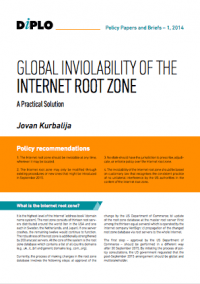
Dr Kurbalija explains the internet root zone, and highlights the context and controversy of questions about its inviolability. Possible solutions identified by him include legal elements (customary law, diplomatic law, common heritage of mankind), ‘software’ inviolability, and ‘hardware’ inviolability.
He makes four recommendations:
- The internet root zone should be inviolable at any time, wherever it may be located.
- The internet root zone may only be modified through existing procedures or new ones that might be introduced in September 2015.
- No state should have the jurisdiction to prescribe, adjudicate, or enforce policy over the internet root zone.
- The inviolability of the internet root zone should be based on customary law that recognises the consistent practice of no unilateral interference by the US authorities in the content of the internet root zone.
